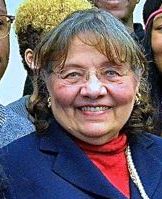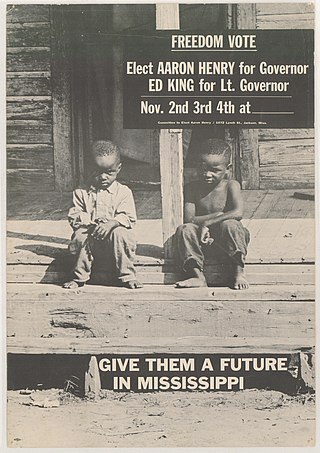Related Research Articles

The civil rights movement was a social movement and campaign from 1954 to 1968 in the United States to abolish legalized racial segregation, discrimination, and disenfranchisement in the country. The movement had its origins in the Reconstruction era during the late 19th century and had its modern roots in the 1940s, although the movement made its largest legislative gains in the 1960s after years of direct actions and grassroots protests. The social movement's major nonviolent resistance and civil disobedience campaigns eventually secured new protections in federal law for the civil rights of all Americans.

The Student Nonviolent Coordinating Committee was the principal channel of student commitment in the United States to the civil rights movement during the 1960s. Emerging in 1960 from the student-led sit-ins at segregated lunch counters in Greensboro, North Carolina, and Nashville, Tennessee, the Committee sought to coordinate and assist direct-action challenges to the civic segregation and political exclusion of African Americans. From 1962, with the support of the Voter Education Project, SNCC committed to the registration and mobilization of black voters in the Deep South. Affiliates such as the Mississippi Freedom Democratic Party and the Lowndes County Freedom Organization in Alabama also worked to increase the pressure on federal and state government to enforce constitutional protections.
The Mississippi Freedom Democratic Party (MFDP), also referred to simply as the Freedom Democratic Party, was an American political party that existed in the state of Mississippi from 1964 to 1968, during the Civil Rights Movement. Created as the partisan political branch of the Freedom Democratic organization, the party was organized by African Americans and White Americans sympathetic to the Civil Rights Movement from Mississippi to challenge the established power of the state Mississippi Democratic Party, which at the time opposed the Civil Rights Movement and allowed participation only by Whites, despite the fact that African Americans made up 40% of the state population.

Freedom Summer, also known as the Freedom Summer Project or the Mississippi Summer Project, was a volunteer campaign in the United States launched in June 1964 to attempt to register as many African-American voters as possible in Mississippi. Blacks had been restricted from voting since the turn of the century due to barriers to voter registration and other laws. The project also set up dozens of Freedom Schools, Freedom Houses, and community centers such as libraries, in small towns throughout Mississippi to aid the local Black population.

Fannie Lou Hamer was an American voting and women's rights activist, community organizer, and a leader in the civil rights movement. She was the vice-chair of the Freedom Democratic Party, which she represented at the 1964 Democratic National Convention. Hamer also organized Mississippi's Freedom Summer along with the Student Nonviolent Coordinating Committee (SNCC). She was also a co-founder of the National Women's Political Caucus, an organization created to recruit, train, and support women of all races who wish to seek election to government office.

The March Against Fear was a major 1966 demonstration in the Civil Rights Movement in the South. Activist James Meredith launched the event on June 5, 1966, intending to make a solitary walk from Memphis, Tennessee, to Jackson, Mississippi via the Mississippi Delta, starting at Memphis's Peabody Hotel and proceeding to the Mississippi state line, then continuing through, respectively, the Mississippi cities of Hernando, Grenada, Greenwood, Indianola, Belzoni, Yazoo City, and Canton before arriving at Jackson's City Hall. The total distance marched was approximately 270 miles over a period of 21 days. The goal was to counter the continuing racism in the Mississippi Delta after passage of federal civil rights legislation in the previous two years and to encourage African Americans in the state to register to vote. He invited only individual black men to join him and did not want it to be a large media event dominated by major civil rights organizations.
Mary Elizabeth King is a professor of Peace and Conflict Studies at the United Nations affiliated University for Peace, a political scientist, and author of several publications. She is a graduate of Ohio Wesleyan University and received a doctorate in international politics from Aberystwyth University in 1999. She is also a Fellow of the Rothermere American Institute and a distinguished Scholar at the American University Center for Global Peace in Washington D.C.

Diane Judith Nash is an American civil rights activist, and a leader and strategist of the student wing of the Civil Rights Movement.
Annie Bell Robinson Devine (1912–2000) was an American activist in the Civil Rights Movement.

Doris Adelaide Derby was an American activist and documentary photographer. She was the adjunct associate professor of anthropology at Georgia State University and the founding director of their Office of African-American Student Services and Programs. She was active in the Mississippi civil rights movement, and her work discusses the themes of race and African-American identity. She was a working member of the Student Nonviolent Coordinating Committee (SNCC) and co-founder of the Free Southern Theater. Her photography has been exhibited internationally. Two of her photographs were published in Hands on the Freedom Plow: Personal Accounts by Women in SNCC, to which she also contributed an essay about her experiences in the Mississippi civil rights movement.
Victoria Jackson Gray Adams was an American civil rights activist from Hattiesburg, Mississippi. She was one of the founding members of the influential Mississippi Freedom Democratic Party.
The Council of Federated Organizations (COFO) was a coalition of the major Civil Rights Movement organizations operating in Mississippi. COFO was formed in 1961 to coordinate and unite voter registration and other civil rights activities in the state and oversee the distribution of funds from the Voter Education Project. It was instrumental in forming the Mississippi Freedom Democratic Party. COFO member organizations included the National Association for the Advancement of Colored People.

Unita Zelma Blackwell was an American civil rights activist who was the first African-American woman to be elected mayor in the U.S. state of Mississippi. Blackwell was a project director for the Student Nonviolent Coordinating Committee (SNCC) and helped organize voter drives for African Americans across Mississippi. She was also a founder of the US–China Peoples Friendship Association, a group dedicated to promoting cultural exchange between the United States and China. She also served as an advisor to six US presidents: Lyndon Johnson, Richard Nixon, Gerald Ford, Jimmy Carter, Ronald Reagan, and Bill Clinton.

The Freedom Singers originated as a quartet formed in 1962 at Albany State College in Albany, Georgia. After folk singer Pete Seeger witnessed the power of their congregational-style of singing, which fused black Baptist a cappella church singing with popular music at the time, as well as protest songs and chants. Churches were considered to be safe spaces, acting as a shelter from the racism of the outside world. As a result, churches paved the way for the creation of the freedom song. After witnessing the influence of freedom songs, Seeger suggested The Freedom Singers as a touring group to the SNCC executive secretary James Forman as a way to fuel future campaigns. Intrinsically connected, their performances drew aid and support to the Student Nonviolent Coordinating Committee (SNCC) during the emerging civil rights movement. As a result, communal song became essential to empowering and educating audiences about civil rights issues and a powerful social weapon of influence in the fight against Jim Crow segregation. Rutha Mae Harris, a former freedom singer, speculated that without the music force of broad communal singing, the civil rights movement may not have resonated beyond of the struggles of the Jim Crow South. Their most notable song “We Shall Not Be Moved” translated from the original Freedom Singers to the second generation of Freedom Singers, and finally to the Freedom Voices, made up of field secretaries from SNCC. "We Shall Not Be Moved" is considered by many to be the "face" of the Civil Rights movement. Rutha Mae Harris, a former freedom singer, speculated that without the music force of broad communal singing, the civil rights movement may not have resonated beyond of the struggles of the Jim Crow South. Since the Freedom Singers were so successful, a second group was created called the Freedom Voices.

Frank Smith, Jr., is a civil rights activist and politician in Washington, D.C.
Hollis Watkins was an American activist who was part of the Civil Rights Movement activities in the state of Mississippi during the 1960s. He became a member and organizer with the Student Nonviolent Coordinating Committee (SNCC) in 1961, was a county organizer for 1964's "Freedom Summer", and assisted the efforts of the Mississippi Freedom Democratic Party to unseat the regular Mississippi delegation from their chairs at the 1964 Democratic Party national convention in Atlantic City. He founded Southern Echo, a group that gives support to other grass-roots organizations in Mississippi. He also was a founder of the Mississippi Veterans of the Civil Rights Movement.

Charles E. "Charlie" Cobb Jr. is a journalist, professor, and former activist with the Student Nonviolent Coordinating Committee (SNCC). Along with several veterans of SNCC, Cobb established and operated the African-American bookstore Drum and Spear in Washington, D.C., from 1968 to 1974. Currently he is a senior analyst at allAfrica.com and a visiting professor at Brown University.

Samuel Leamon Younge Jr. was a civil rights and voting rights activist who was murdered for trying to desegregate a "whites only" restroom. Younge was an enlisted service member in the United States Navy, where he served for two years before being medically discharged. Younge was an active member of the Student Nonviolent Coordinating Committee (SNCC) and a leader of the Tuskegee Institute Advancement League.

Dorie Ann Ladner was an American civil rights activist.

The Freedom Vote, also known as the Freedom Ballot, Mississippi Freedom Vote, Freedom Ballot Campaign, or the Mississippi Freedom Ballot, was a 1963 mock election organized in the U.S. state of Mississippi to combat disenfranchisement among African Americans. The effort was organized by the Council of Federated Organizations (COFO), a coalition of Mississippi's four most prominent civil rights organizations, with the Student Nonviolent Coordinating Committee (SNCC) taking a leading role. By the end of the campaign, over 78,000 Mississippians had participated. The Freedom Vote directly led to the creation of the Mississippi Freedom Democratic Party (MFDP).
References
- ↑ Lisa Anderson Todd (1 December 2014). For a Voice and the Vote: My Journey with the Mississippi Freedom Democratic Party. University Press of Kentucky. p. 49. ISBN 978-0-8131-4717-8.
- ↑ Thurman, Octavia (27 February 2013). "Euvester Simpson". Jackson Free Press, Retrieved March 26, 2015
- 1 2 Rev. Ed King; Trent Watts (7 October 2014). Ed King's Mississippi: Behind the Scenes of Freedom Summer. Univ. Press of Mississippi. p. 80. ISBN 978-1-62674-330-4.
- ↑ Kay Mills (1994). This Little Light of Mine: The Life of Fannie Lou Hamer. University Press of Kentucky. pp. 60–. ISBN 0-8131-9182-3.
- ↑ United States Commission On Civil Rights (1965). Justice in Jackson, Mississippi: Hearings Held in Jackson, Miss., February 16-20, 1965. Ayer Company Pub. p. 478. ISBN 978-0-405-03401-5.
- ↑ Kerran L. Sanger (1 December 1995). When the Spirit Says Sing!: The Role of Freedom Songs in the Civil Rights Movement. Routledge. pp. 19–. ISBN 978-1-136-60129-3.
- ↑ Pete Daniel (2013). Dispossession: Discrimination Against African American Farmers in the Age of Civil Rights. UNC Press Books. pp. 83–. ISBN 978-1-4696-0201-1.
- ↑ "Civil rights activist, Euvester Simpson, among those to get Hamer Award". The Mississippi Link, April 10, 2013 By Monica Land
- ↑ "Freedom Summer of 1964 was mission in hostile territory". Deborah Barfield Berry, Gannett Washington Bureau, USA Today, February 4, 2014